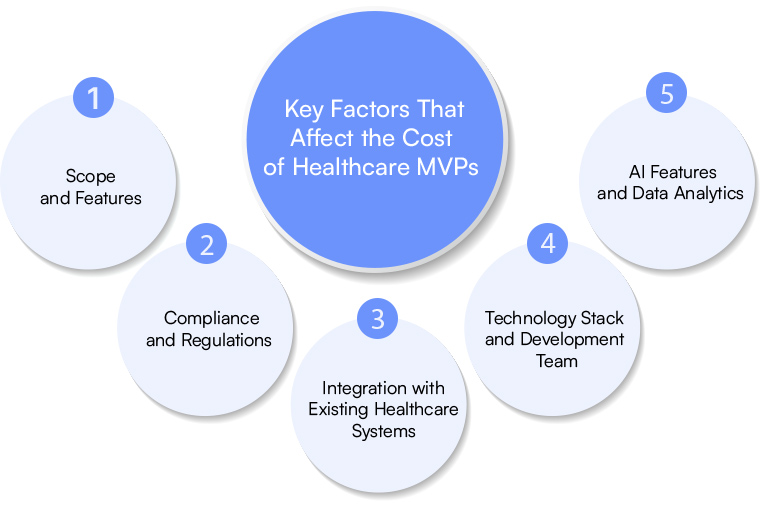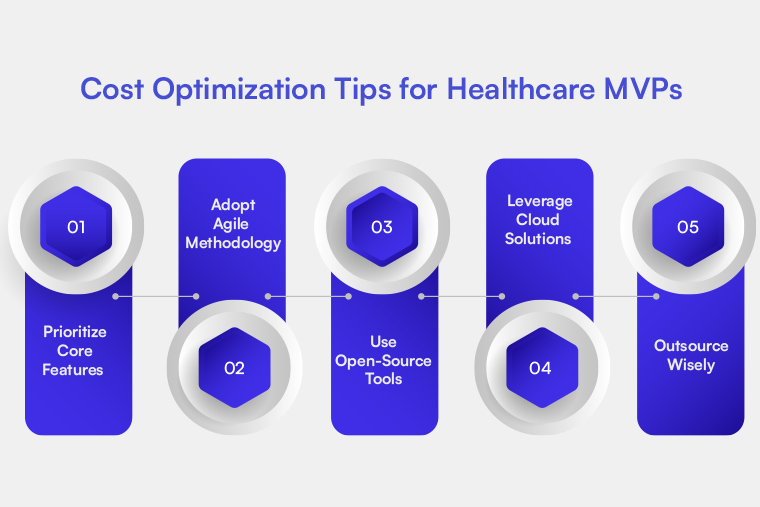Introduction: Understanding the Importance of Healthcare MVP Cost Estimation
When it comes to healthcare innovation, launching an MVP (Minimum Viable Product) is often the first crucial step toward building a scalable product. But, as with any startup, the budget is always a top concern. Healthcare startups must contend with unique challenges such as stringent regulations (e.g., HIPAA compliance), complex integrations with existing healthcare systems (like EHRs), and data privacy concerns.
In 2026, the landscape of MVP development in healthcare is evolving rapidly—especially with the infusion of AI capabilities, cloud solutions, and automation. As exciting as the possibilities are, they come with financial implications that need careful consideration. In this post, we’ll break down the factors affecting the cost of healthcare MVPs in 2026 and offer insights into how you can manage your budget effectively. Additionally, we will introduce you to our AI-powered Healthcare MVP Cost Calculator, a tool designed to simplify your cost estimation process.
The Healthcare MVP Landscape in 2026

The healthcare MVP in 2026 is no longer just about creating a basic prototype to showcase the concept. Today’s healthcare MVPs are sophisticated, integrated systems that need to be scalable, secure, and compliant with industry regulations. Whether you’re building a telehealth app, an AI-powered diagnostic tool, or a population health management platform, your MVP must cater to a variety of stakeholders, including doctors, patients, insurance companies, and regulatory bodies.
What Makes Healthcare MVPs Unique?
Healthcare MVPs are different from standard product MVPs for several reasons:
- Compliance and Security: HIPAA and other healthcare regulations mandate strict security controls.
- Integration with Legacy Systems: Many healthcare apps must interface with EHRs, lab systems, and even wearable devices.
- Clinical Validation: MVPs in healthcare often need clinical validation before they can scale to full-fledged products.
- Complex User Flows: Healthcare apps often involve multiple user types (doctors, patients, insurance providers), and each user type requires a specific experience.
Key Factors That Affect the Cost of Healthcare MVPs

Building a healthcare MVP is no small feat, and the cost can vary significantly depending on several factors. Let’s look at these key drivers:
1. Scope and Features
The scope of your MVP will directly impact its development cost. Start by defining the minimum set of features that are essential for your MVP to validate the concept. Common features in healthcare MVPs include:
- User Authentication and Authorization: For patient and doctor profiles.
- Clinical Data Management: Managing sensitive health records, treatment plans, and prescriptions.
- AI-Driven Insights: For features like predictive analytics, triage, or automated reporting.
- Telemedicine Functionality: Video consultations, patient messaging, and appointment scheduling.
2. Compliance and Regulations
Healthcare apps must adhere to a variety of compliance standards:
- HIPAA Compliance: The Health Insurance Portability and Accountability Act mandates strict security measures for handling patient data.
- FDA Approval: If the app is classified as a medical device (e.g., diagnostic tools), it may need FDA clearance.
- GDPR (if operating in Europe): For data privacy and user rights, especially when dealing with personal health data.
Compliance can add significant cost to development, as you’ll need to incorporate security protocols, encryption, audit trails, and access controls into the MVP from the very beginning.
3. Integration with Existing Healthcare Systems
A major consideration in the cost of building a healthcare MVP is integration with existing systems. Many healthcare MVPs need to connect with:
- EHR Systems (Electronic Health Records): Integrating with EHR platforms like Epic, Cerner, and Allscripts.
- Billing Systems: Ensuring that your MVP supports insurance claims and billing workflows.
- Wearable Devices: Integration with devices like smartwatches or health trackers for monitoring patient vitals.
These integrations are often complex and can be costly, especially when working with proprietary or legacy systems.
4. Technology Stack and Development Team
The choice of technology stack also impacts the overall cost. Common stacks used in healthcare MVPs include:
- Frontend Technologies: React, Angular, Vue.js (for building scalable and interactive UIs).
- Backend Technologies: Node.js, .NET, Python (for building secure and scalable backends).
- Cloud Infrastructure: AWS, Azure, Google Cloud (for HIPAA-compliant cloud solutions).
- AI Tools: TensorFlow, PyTorch, or custom algorithms for predictive analytics and machine learning.
Additionally, the type of development team you choose—whether you hire in-house, outsource, or work with an agency—will influence both the timeline and budget.
5. AI Features and Data Analytics
As healthcare becomes more data-driven, integrating AI into your MVP is a great way to add value. AI features such as predictive modeling, medical image recognition, and automated decision support can make your MVP stand out. However, these features can also drive up development costs due to the complexity of the algorithms, the need for a robust data pipeline, and the potential cost of specialized talent.
Healthcare MVPs: 2026 vs. Earlier
.png)
Healthcare MVP Development Costs: Estimated Range
Now that we’ve discussed the major factors that impact the cost of healthcare MVPs, let’s break down the estimated costs based on the level of complexity:
- Basic MVP: $10,000 – $50,000
For a simple app that doesn’t require complex integrations or heavy AI features. This might include a basic telemedicine platform with essential features like appointment scheduling and video calls.
- Intermediate MVP: $50,000 – $150,000
For apps that need moderate complexity, such as integration with EHR systems, basic AI functionality, or a more polished user experience. Examples might include patient portals or chronic care management apps.
- Advanced MVP: $150,000 – $500,000+
For complex MVPs that require deep integration, advanced AI/ML features, and strong compliance measures. This could be a mobile health platform with predictive analytics, integration with wearable devices, and HIPAA compliance.
Note: These costs are approximate and can vary based on your specific requirements.
How Long Does It Take to Build a Healthcare MVP?
Timelines can vary depending on the complexity and scope of the project. Here’s a rough guide to the time it might take to develop a healthcare MVP:
- Basic MVP: 6 – 12 weeks
- Intermediate MVP: 12 – 24 weeks
- Advanced MVP: 24 – 40 weeks
Cost Optimization Tips for Healthcare MVPs

Building a healthcare MVP doesn’t always mean breaking the bank. Here are a few ways to optimize your budget:
1. Prioritize Core Features
Focus on the core features that are essential to your target audience and business goals. Additional features can be added after your MVP is validated and you have a clearer understanding of user needs.
2. Adopt Agile Methodology
Agile development allows for iterative progress, enabling you to release a working MVP faster while also incorporating user feedback along the way. This method reduces the risk of building unnecessary features and can help control costs.
3. Use Open-Source Tools
There are many open-source libraries and frameworks available for building healthcare applications. These can significantly reduce development time and costs, especially when it comes to integrating standard features like authentication, data encryption, and analytics.
4. Leverage Cloud Solutions
Cloud platforms like AWS, Google Cloud, and Azure offer HIPAA-compliant solutions that can save time and money in building infrastructure. Using these platforms can also scale your app more efficiently as it grows.
5. Outsource Wisely
Hiring a third-party development agency or outsourcing specific tasks (e.g., security, AI, cloud management) may be more cost-effective than hiring an in-house team, especially for early-stage MVPs.
Use the Healthcare MVP Cost Calculator
To get a better idea of what your healthcare MVP might cost, we encourage you to use our Healthcare MVP Cost Calculator. This tool allows you to customize your project’s specifications—such as features, compliance needs, integrations, and technology stack—and provides you with a tailored cost estimate. Try it out now!
Explore the Healthcare MVP Cost Calculator
Conclusion
Understanding the cost of building a healthcare MVP in 2026 is crucial to making informed decisions that align with your startup’s goals and budget. By considering key factors such as scope, compliance, technology stack, and AI features, you can estimate your development costs more accurately. Tools like our Healthcare MVP Cost Calculator can help streamline the budgeting process and provide you with actionable insights.
Ready to get started? Estimate your healthcare MVP cost now.

